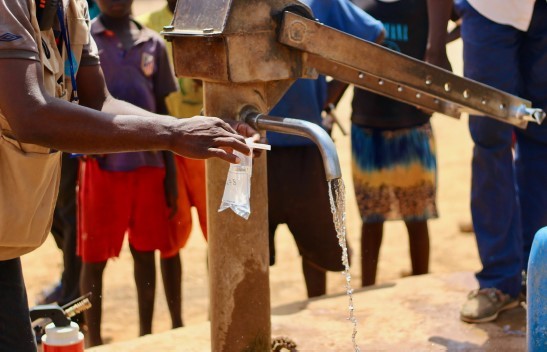Speeches Shim

Arbinda commune has experienced some of the worst terrorist attacks in Burkina Faso. Violent Extremist Organizations (VEOs), who grow ever bolder, have now started to strangle this vital community in Sahel region by cutting off water access to the town and conducting deadly attacks, leaving 63 civilians killed by March 2020. Social media videos highlighting the plight of Arbinda's citizens as they struggled to access safe water came to light. The National Office for Water and Sanitation (ONEA), the state water authority charged with providing safe drinking water, has stated that they will not go into Arbinda to repair water points damaged by VEOs until the state can guarantee their engineers' safety. Since the state has shown an insufficient response to the needs of the town’s residents, solutions to VEO influence had to be leveraged from within the community itself.
USAID/OTI's Burkina Faso Regional Program (BFRP) worked with Initative: Eau, an American non-profit organization operating in Burkina Faso since 2013, which focuses on Water, Sanitation, and Hygiene (WASH). BFRP and Initative: Eau conducted a mapping exercise to find existing water points and measure drinking water access in the commune of Arbinda, so that ONEA, once deemed safe, could repair water points damaged by the ongoing insecurity. The mapping included physical location, access, production (flow rate), and quality of water available at each point. Using information about the commune’s population, as well as numbers from the recent influx of people from neighboring towns fleeing VEO violence and threats, Initiative: Eau produced a report which analyzed the quality and quantity of water sources available within the commune, as well as a strategy with recommendations to optimize these sources to serve the ever growing dispalced citizens of Arbinda.
OTI also shared this report with international partners who are active in the WASH sector and those willing to work with the commune and provide support.
"We will launch an advocacy effort for the financing of the report's recommendations at the WASH sector level, and we will keep you posted,” said the Coordinator of the WASH Cluster at UNICEF Burkina upon receipt of the report.
The interest shown by WASH stakeholders gives hope for future interventions in Arbinda and helps to also strengthen the voices of community leaders.

Comment
Make a general inquiry or suggest an improvement.